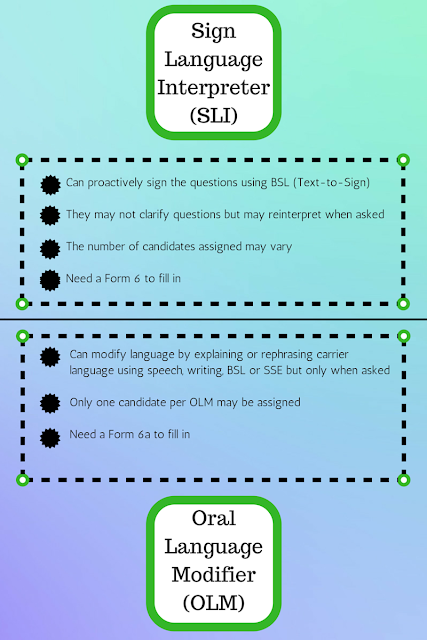Exams, just the word alone, are enough to drive fear and anxiety. Not many of us enjoy them (Unless you’re a constant A* student), but with a good schedule, containing revision, a rest, something to eat and a well-deserved break, you will certainly feel more relaxed and confident. Exams are a pressured based system and can be the finale of 1, 2, 3 or even more years of work! There is a lot of pressure for students to pass and progress in their desired careers and many hoops to get through to get to their desired destination, and this applies to hearing & deaf students alike.
Things to consider:
– Regulations (Subject to change each year)
– The Candidate (Progressing from a learner to a candidate in the final exam)
– The Person In The AA (Access Arrangement) role (With Preparation starting at the beginning of the term)
– The Examinations Staff
– The Exam Itself
All have a big impact on the experience of deaf candidates and their chances of obtaining the result they deserve. The question may not make sense on its own, such as needing to fill in a blank space. This then needs to be effectively interpreted by a deaf student.
It is vital that in your role supporting a deaf candidate, you provide fair access to the exam whilst maintaining the rigour of the exam. Regulations must be followed. However, universities are not covered, with some having access arrangements and some not. Online examinations will lack the support facilities and structure needed as questions cannot be seen beforehand. On the other hand, written exams (The more traditional sense) allow the support worker the ability to see the exam an hour before it is due to take place, giving them time to digest the questions.
What Different Roles Are There In Place For Deaf Candidates?
As you can see, the main 2 support workers are a Sign Language Interpreter(SLI) and Oral Language Modifier (OLM). The candidate is only assigned an OLM if they have taken part in an English test and got below the minimum requirement. However, the role of an OLM is disliked by regulators and the awarding bodies, not those who actually perform the role. The role has been made much stricter over the years, as the regulators are trying to cut down on spending and may eventually eradicate it. Some OLMs have changed words such as ‘decay’ to ‘die’, which could hinder a deaf candidate’s chances of success; this doesn’t give those in charge the confidence of good access/support.
If you want to find out more about what exactly an Oral Language Modifier is, go to http://ciea.co.uk here you will find a one-day workshop that will teach you all about what an OLM is and how to undertake the workshop and work towards becoming a registered OLM. If you google Oral Language Modifier Handbook, you will find all the resources that you need to know about an OLM. There is another known accredited course; this one is an online training course, which can be found at https://www.communicate-ed.org.uk/courses/oral-language-modifier-accredited-training
Another webpage that offers helpful information is adept (Association of Deaf Education Professionals & Trainees) – www.adeptuk.co.uk
Advice
Do Not Look At The Candidate’s Answers
A communication professional may feel disappointed if they see their candidate’s answers may indicate they will fail. They may feel responsible and seek to rectify it. They may suggest that certain answers be checked and amended. You must not do this!
Make A Glossary With Spellings & Meanings To Be Reinforced & Repeated Through The Course
This will lead the learner (And future candidate) with the spelling of keywords. It also helps any staff who may be covering for the communication professional. The candidate must not see this glossary during the exam.
What If A Candidate Cheats?
The communication professional must act immediately; if they wait until after the exam, then it will be impossible to do anything. Once the candidates have left the room, and all evidence has been taken away, nothing can be proved.
Inform the invigilator of any wrongdoings, doing so as confidentially as possible to avoid a scene and ruining the environment for all candidates. Write a note containing all the details of the infringement and give it to the invigilator as soon as possible and as confidential as possible. If you think something has happened, but are unsure, again, pass a note to the invigilator and ask them to monitor the situation.
What If There Is No Invigilator?
The communication professional must not support the candidate. Staff in AA roles have strict policies that state they must not work alone in exams and make sure they are never alone. Insist there is an invigilator present throughout.
Am I Asked To Support Multiple Candidates At The Same Time?
You may be asked to, but in practice, it is a very difficult scenario and not feasible or fair to assume such a role.
However, there may not be anyone else, and if you say no, the exam cannot go on. In this scenario, ensure all the candidates are stationed near each other; so you are not rushing around the room.
Ask for an extra paper for each candidate so you can track their pace, and ensure you are ready for their stage of the exam.
It is possible that one candidate will eat up a lot of time. Should another candidate acquire your attention, respond immediately to give them a fair opportunity.
You may be undertaking different roles for different candidates. Make a note of what your AA role is, so you don’t make a mistake. Once you’ve got through and made the best out of a bad situation, make sure you review it so that future exams and situations run more smoothly and appropriately.
Keep A Look Out…..
I hope you have found this information interesting but, most of all, useful!
If this domain-specific content is of interest to you, then keep a look out for our future content here at terptree. We have some very exciting content coming that we think you’ll be interested in!





